Realizing the power of collective intelligence today

Making Knowledge Work™ has never been more critical because the future of work is knowledge work.
This bold statement is based on the findings of a robust, independent global study commissioned by us to explore the state of the global knowledge work industry in 2022.
The study includes qualitative and quantitative analyses of over 500,000 global digital conversations, a survey of 2,000 global respondents, and one-to-one depth interviews with 29 subject matter experts.
Every research respondent works in an organization operating in the knowledge economy, which is reliant on digital documents containing IP that require protection and governance. These organizations can be businesses, e.g., Legal Firms, Tax Firms, Accountancy Firms, or specialist teams within businesses, e.g., corporate law, corporate finance, procurement, HR, etc. We refer to these as Knowledge Work Organizations or KWOs.
In 2019, 27% of knowledge workers worked remotely or in a hybrid model. By January 2022, 58% did. (Gartner)
Explore this page
- What is happening in the Knowledge Work economy?
- What is collective intelligence?
- What does it look like if you successfully harness the power of collective intelligence?
- What does it feel like if you successfully harness the power of collective intelligence?
- How do businesses act if they have successfully harnessed the power of collective intelligence?
- Why is collective intelligence so important right now?
What is happening in the Knowledge Work economy?
As we said earlier, the future of work is knowledge work. If you are a KWO, regardless of the sector you work in, finding, nurturing, and retaining knowledge workers amidst the widely reported great global resignation is a challenge we all face.
Knowledge workers expectations of work life balance and the cultures that they want to work in have fundamentally changed.
In 2019, 27% of knowledge workers worked remotely or in a hybrid model. By January 2022, 58% did. (Gartner)
The Future Forum Pulse predicts this trend will continue. Their research suggests that 78% of global knowledge workers want flexibility to work where they want and 95% want flexibility to work when they want. If their employers can’t or won’t offer that flexibility, they are ready to pack up their cumulative knowledge and head out the door.
"Many well-compensated but burnt-out knowledge workers have long felt that their internal ledger books were out of balance: they worked long hours, they made good money, they had lots of stuff, they were exhausted, and, above all, they saw no easy options for changing their circumstances”
New Yorker 2021
Let’s do the math quickly: 482 million knowledge workers
Yes – 482 million knowledge workers are ready to vote with their feet in search of employers, work cultures, processes, and technologies that make their working lives easier, more productive and fulfilling.
They are looking for organizations that understand the value of operationalizing knowledge work and believe in the power of collective intelligence.
How knowledge work matures
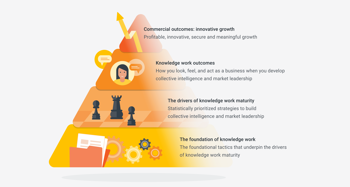
"Realigning with changed employee expectations: “COVID pushed the snowball down the hill and now it's picking up steam, it’s accelerated the foray into new technologies and really kicking the tires on what we have and seeing, does this really meet our employees’ needs now that most people are still working from home? There's got to be a renewed emphasis on … making sure everyone has what they need."
Attorney, Insurance Company
What is Collective Intelligence?
Collective intelligence is a concept that has its roots in science - sociology, socio-biology, political science, and anthropology. It is typically considered the outcome of collaboration, collective efforts, and competition of many individuals that typifies consensus decision-making and crowd sourcing.
In a commercial knowledge work context, we are defining collective intelligence as:
The outcome of ongoing collaboration, operationalizing experience, data, knowledge, best practice, and IP company wide. Technology, process and culture values and rewards past, present, future, and diverse knowledge to drive superior employee and customer experiences, market leadership, growth, and organizational value.
Based on this definition, our research shows that only 42% of global KWOs strongly agree that the benefits of collective intelligence are fully realized within their organization.
Collective intelligence makes it feel like everyone is working for one business, one team and towards one set of shared goals.
What does it look like if you successfully harness the power of collective intelligence?
- KWOs that invest in building collective intelligence look different, feel different and act differently from those that do not.
- They are customer centered and bring enhanced value to every interaction based on commitment to delivering best practice quickly and consistently.
- They are perceived as industry leaders, held up as examples of excellence in knowledge management and knowledge work.
- They are exactly the kind of businesses that the 482 million knowledge workers looking for new roles want to work for.
- Their employees not only want to stay with them, but actively advocate for their employer as a great place to work.
- They are recognized internally and externally for making investments focused on delivering superior value to customers and making knowledge work easier by allowing employees to focus on their most valuable and important work.
How the business looks
Comparing those fully realizing the benefits of collective intelligence with those who are not.
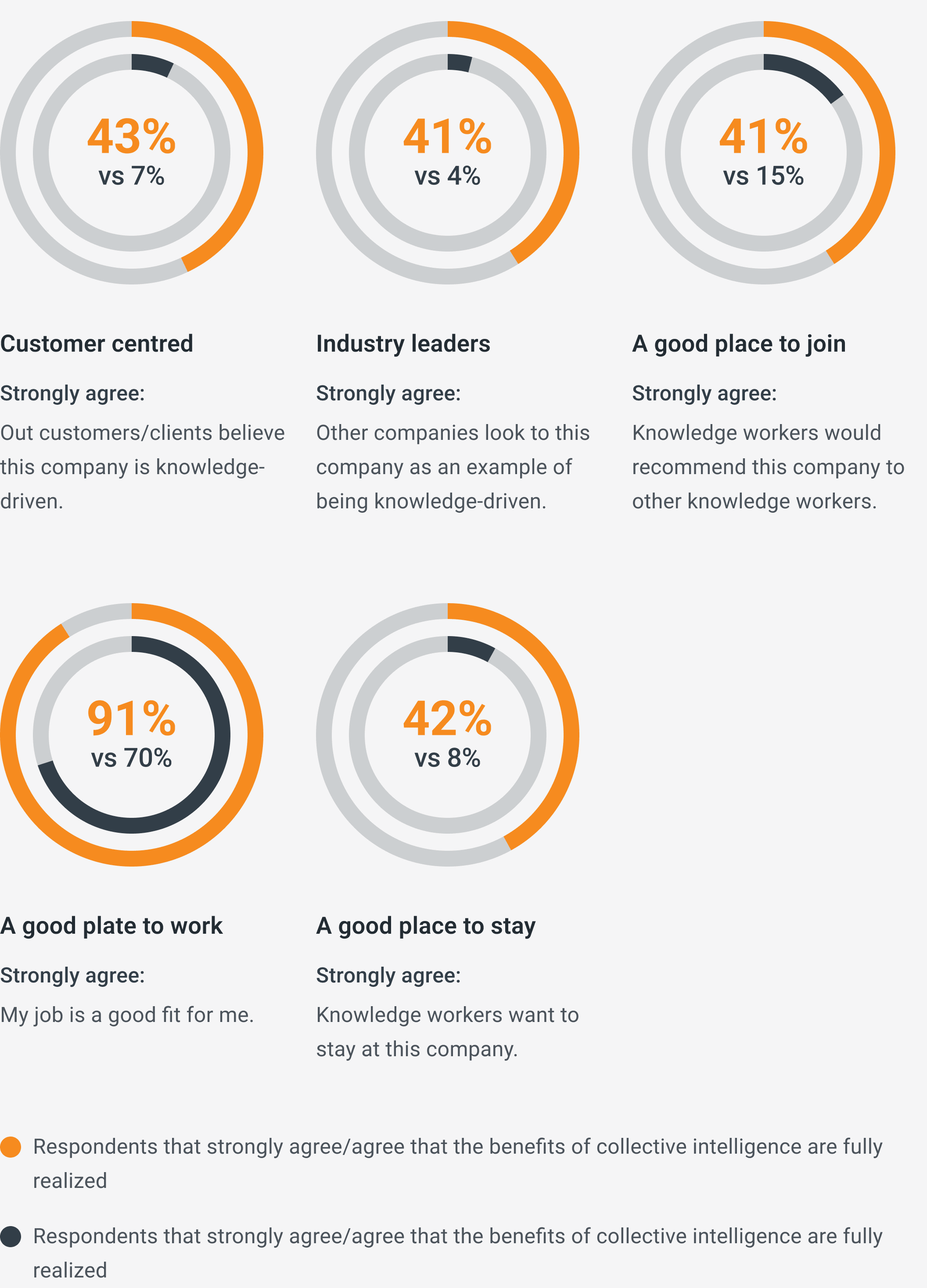
“The top goal at the moment is hyper-automation… to move the pain and mundane out of the way and allow our lawyers to focus on the highest value-add work that they possibly can.”
CIO Law Firm
What does it feel like if you successfully harness the power of collective intelligence?
KWOs championing collective intelligence don’t just look different, they feel different.
- They make room for innovation and people are encouraged to learn from both success and challenging situations.
- They are forward-looking yet retain respect for the past – historical knowledge is considered as important as new, innovative perspectives.
- Knowledge work is valued and rewarded, both for specific contributions made to collective intelligence and through standard remuneration, bonuses, and promotional opportunities.
- A commitment to collective intelligence puts a stop to frustrations generated from siloed thinking, decision making and working practices.
How the business feels
Comparing those fully realizing the benefits of collective intelligence with those who are not
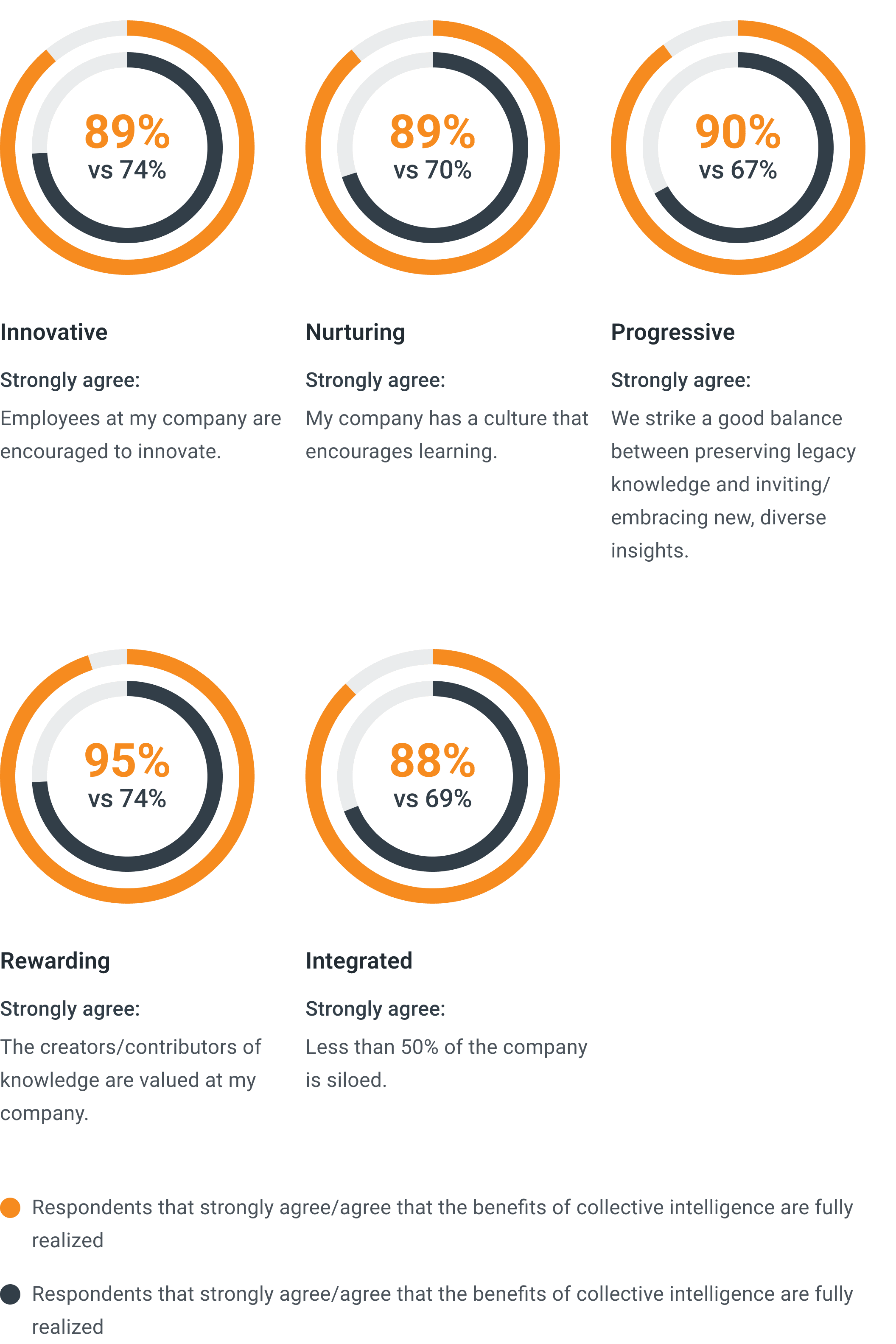
“We're looking to modernize … I'm also looking to be data-centric. We have a lot of data, and to be frank, we don't use a lot of it right now. It's not as accessible as it could be. We're trying to look at how we can, through either data integration, API integration or data warehousing, make more data available to more people so we can start shifting into a data-driven decision-making organization.”
CIO at Law Firm
How do businesses act if they have successfully harnessed the power of collective intelligence?
KWOs commitment to collective intelligence do things differently too.
- They have a defined knowledge management strategy in place, and they are more likely to increase their investments in knowledge work tools and training in the coming year.
- They are more likely to offer flexible working (yes – we are back to those 482 million at risk knowledge workers).
- They actively recruit for diversity of thought, background, and experience. They systematically pursue diversity and inclusion through auditing job descriptions, policies, practices, internal and external communications for bias.
- Most importantly, they look outside their own domain to enhance their knowledge and broaden their collective intelligence, taking best practices from different industries and applying them to their own.
How the business acts
Comparing those fully realizing the benefits of collective intelligence with those who are not.
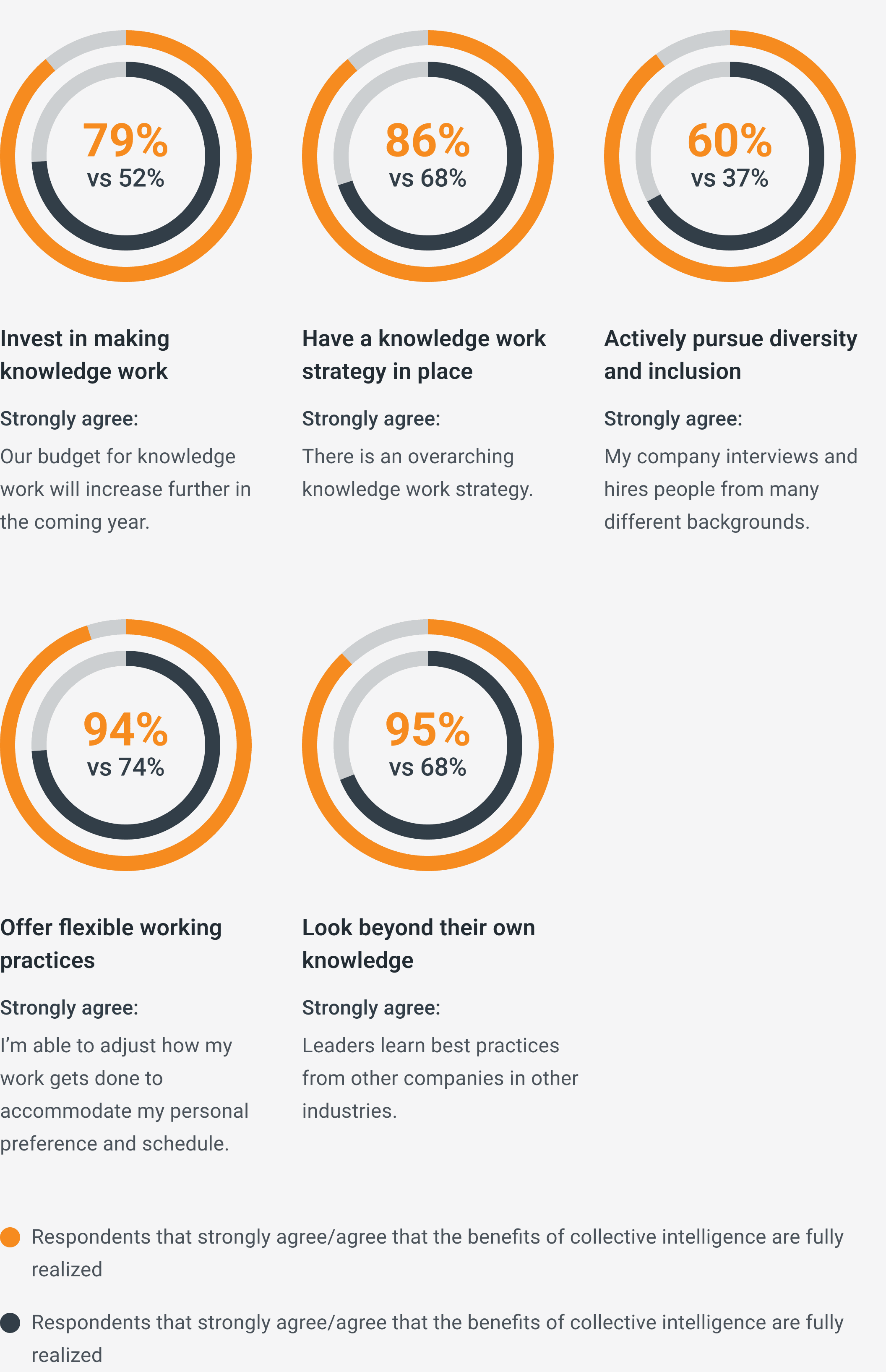
“We are really taking a very people-centric approach [enabling remote work] … It's not about where you are, it's about who you are and how you work and how that's served up by technology.”
Chief Digital Officer at Law Firm
Why is collective intelligence so important right now?
There are many business benefits that KWOs enjoy when they realize the benefits of collective intelligence, which range from greater efficiency, through securing data to driving revenue and innovation.
We will go deeper on the full range of business outcomes when we introduce the Knowledge Work Maturity Model in full but for now, we will focus on one of the most important current outcomes: ensuring that KWOs can acquire, retain, and nurture the best talent in the industry because the great resignation is real.
The industry could look quite different right now if all KWOs had been focused on building technology, process and cultures that deliver and nurture collective intelligence.
With collective intelligence comes democratizing knowledge and places to work that are diverse, inspiring, healthy, and rewarding where people can strike a strong work life balance while still having successful and fulfilling careers.
The future of knowledge work is collective intelligence
Collective intelligence has the power to move the industry. Instead of almost half current global knowledge workers considering leaving their roles in 2022/23, potentially over three quarters would be committed to stay and actively advocate their employer to peers.
Instead of watching collective intelligence exiting the building or the industry, it is time to make it the year of knowledge work affirmation.
Global Knowledge Workers
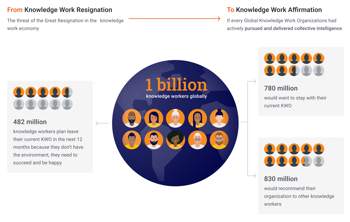
“We are really taking a very people-centric approach [enabling remote work] … It's not about where you are, it's about who you are and how you work and how that's served up by technology.”
Chief Digital Officer at Law Firm
Research Report
The Knowledge Work Maturity Model
An industry-first research study to understand knowledge work maturity and the strategies it takes to unlock better business outcomes.
